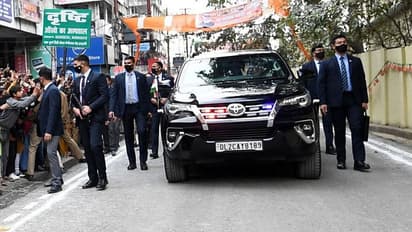Image: SPG personnel around Prime Minister Modi's car. Photograph: PIB
Proximate security is defined as protection provided from close quarters during a journey by aircraft, road, rail, watercraft, or on foot, or any other means of transport, and shall include the places of functions, engagements, residence or halt. The SPG team is mandated to form a ring, isolation cordons, sterile zone around, and the rostrum and access control to the Prime Minister or members of his immediate family.
Parliament enacted the SPG Act after former Prime Minister Indira Gandhi was assassinated in 1984 by her bodyguards outside her official residence in New Delhi. The SPG security was extended to immediate family members of the prime ministers for 10 years after former Prime Minister Rajiv Gandhi was killed in 1991 during an election campaign in Tamil Nadu.
Rajiv’s immediate family members -- Sonia Gandhi, Rahul Gandhi and Priyanka Gandhi -- were the exceptions who had SPG cover for 29 years till 2019. They were under SPG protection based on the security review by the Intelligence Bureau.
The Narendra Modi-led government, in 2019, amended the SPG Act and withdrew proximate security coverage provided to former prime ministers who have demitted the office five years back. Currently, Prime Minister Modi is the only SPG protectee.
